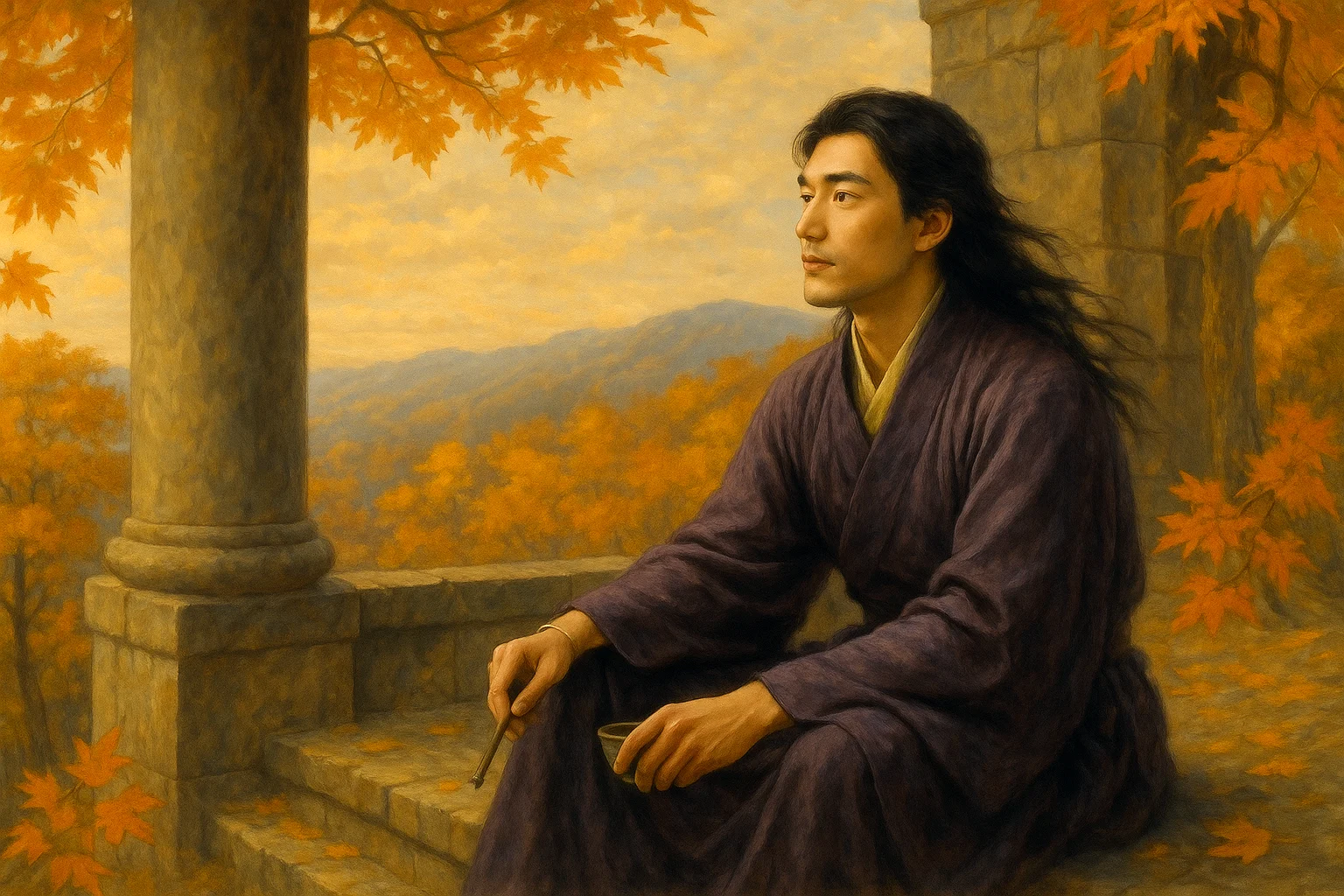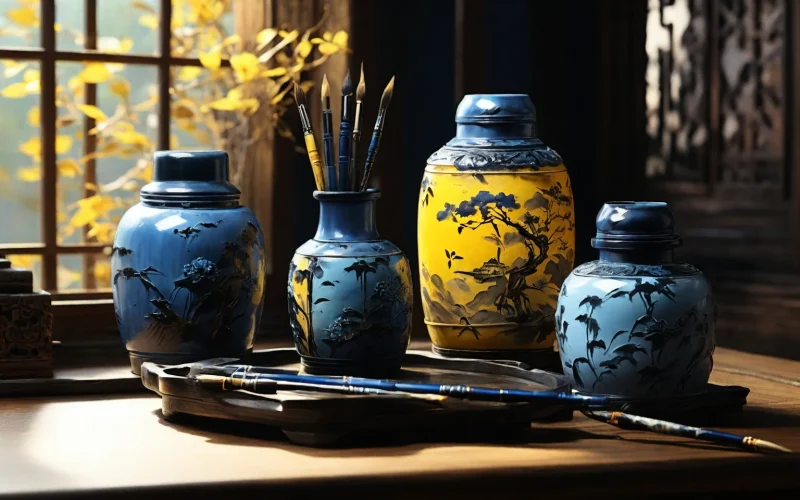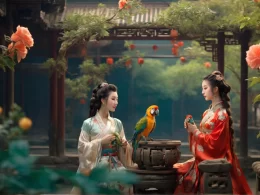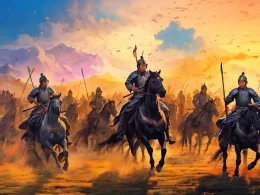Bamboo shames its hollow core,
Yet bears fine tips layered more and more.
Straight shadow guards its upright spine,
Firm heart scorns to hide its line.
Startling winds rise when paper meets,
Shaking voids, it drinks dew's sweets.
For painting, verse - what other choice?
All arts must heed this tool's voice.
Original Poem
「咏宣州笔」
耿玮
寒竹惭虚受,纤毫任几重。
影端缘守直,心劲懒藏锋。
落纸惊风起,摇空见露浓。
丹青与文事,舍此复何从。
Interpretation
This poem by Geng Wei employs the "Xuanzhou brush" as a vehicle for lofty aspirations. Xuanzhou (modern Xuancheng, Anhui) had been renowned since the Tang dynasty for producing exceptional brushes - sharp, resilient, and vigorous, highly prized by literati. Through vivid descriptions of the brush's form, character, and function, the poet embodies scholarly virtues, ambition, and life ideals. While ostensibly praising a writing tool, the work ultimately celebrates the moral integrity and unyielding spirit that define true scholars.
First Couplet: "寒竹惭虚受,纤毫任几重。"
Hán zhú cán xū shòu, xiān háo rèn jǐ zhòng.
The winter bamboo blushes at its hollow core,
While slender bristles bear ten thousand loads or more.
The opening personifies the brush's components. The hollow shaft's "blush" suggests shame at insubstantiality, contrasting with the bristles' capacity to shoulder immense responsibility. This duality mirrors a scholar's vigilance against empty reputation while embracing weighty duties. The pairing of "winter bamboo" (寒竹) and "slender bristles" (纤毫) philosophically encapsulates "great burdens borne by modest means."
Second Couplet: "影端缘守直,心劲懒藏锋。"
Yǐng duān yuán shǒu zhí, xīn jìn lǎn cáng fēng.
Its shadow stands straight by steadfast creed,
Its spirited core scorns to sheath its edge.
Here the brush's physical and spiritual attributes merge. "Stands straight" (守直) and "scorns to sheath" (懒藏锋) depict both an uncurving tool and an uncompromising scholar. The lines vibrate with double meaning - every stroke of the brush becomes an act of moral rectitude, every exposed bristle a declaration of intellectual honesty.
Third Couplet: "落纸惊风起,摇空见露浓。"
Luò zhǐ jīng fēng qǐ, yáo kōng jiàn lù nóng.
On paper it descends like sudden gales,
Through air it swirls with ink-dark trails.
The couplet captures dynamic artistry. "Sudden gales" (惊风起) convey the brush's explosive energy when touching paper, while "ink-dark trails" (见露浓) suggest the fluid majesty of its movements. Beyond praising the tool's excellence, these lines celebrate the scholar's creative power - where thought and expression become meteorological phenomena.
Fourth Couplet: "丹青与文事,舍此复何从。"
Dān qīng yǔ wén shì, shě cǐ fù hé cóng.
For painting's art or letters' noble strife,
What instrument but this can serve this life?
The finale elevates the brush to intellectual necessity. The rhetorical question "What instrument but this" (舍此复何从) declares the brush irreplaceable for all scholarly pursuits. In this exaltation of a humble tool lies profound reverence for the literary and artistic vocation itself - the brush becoming synecdoche for the scholar's entire moral and creative universe.
Holistic Appreciation
This exquisitely crafted object poem uses the Xuanzhou brush as a profound metaphor, progressing from its material and form to its character and function, ultimately ascending to a declaration of scholarly integrity and ideals. Without directly mentioning human qualities, the poem consistently employs the brush as a vehicle for self-expression, seamlessly blending philosophy with emotion. The phrases "upholding rectitude" and "concealing no sharpness" encapsulate the poem's spiritual core, embodying the unyielding scholarly ethos that Geng Wei consistently championed. While ostensibly praising Xuanzhou's brush-making craftsmanship, this work is fundamentally a "self-portrait in verse"—composed against the politically complex backdrop of late High Tang, it expresses through brush imagery the poet's steadfast refusal to compromise his principles for power.
Artistic Merits
- Object as Allegory, Fusion of Form and Spirit: Through meticulous descriptions of the brush's physical attributes, the poem projects the poet's personal ideals, achieving perfect symbiosis between object and self.
- Progressive Structure, Logical Development: The four couplets systematically explore the brush's material, nature, utility, and symbolic value, creating a rigorous intellectual progression.
- Precise Diction, Rich Connotation: Employing economical yet exact imagery, the poem exemplifies the refined Dali poetic style with its restrained depth.
- Sublime in the Mundane: By investing an everyday writing implement with noble spiritual qualities, the work epitomizes the Tang tradition of "expressing ideals through objects."
Insights
The poem reveals that true value lies not in an object's form but in its symbolic function. An ordinary Xuanzhou brush gains profound significance through scholarly use and cultural association. Geng Wei transforms this humble tool into a mirror of Confucian virtues—integrity, transparency, diligence, and efficacy—demonstrating how extraordinary conviction can illuminate ordinary existence. For contemporary readers, this Tang masterpiece serves as a timeless reminder: maintaining authenticity while honoring one's talents allows anyone to shine through principled living.
About the poet

Geng Wei (耿湋, dates unknown), a Tang dynasty poet from Yongji, Shanxi, was among the "Ten Great Talents of the Dali Era." Renowned for his mastery of five-character regulated verse, his poetry is distinguished by its economical diction and tranquil imagery. While the prevailing style of Dali poetry tended toward austerity and desolation, Geng Wei developed a distinctive voice marked by understated naturalism.












